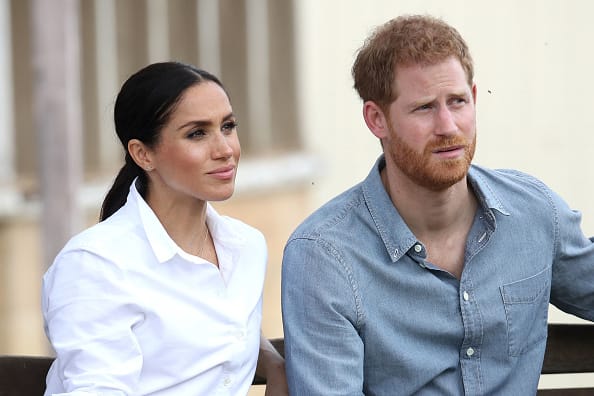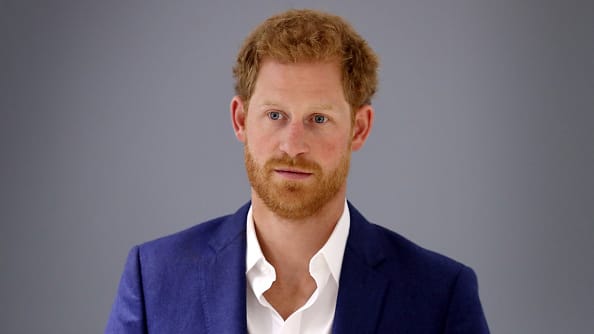Meghan Markle is “feeling much better about everything,” wants a dislike button on Instagram, and only fought a privacy action against the Daily Mail because she believes in standing up for what’s right.
Her husband Prince Harry, meanwhile, warned Twitter co-founder and CEO Jack Dorsey the day before January 6th that he was allowing a coup to be staged on his platform, believes that “literally everyone around the world” is being affected by internet disinformation, and said that “Megxit” is a misogynistic term.
Welcome to the impactful world of the former royals, who served up a double whammy of unimpeachable influencing Tuesday afternoon, appearing at two different online panel discussions just two hours apart.
Meghan was speaking as a guest at Andrew Ross Sorkin’s DealBook online summit, appearing on a panel discussion entitled “Minding The Gap” with Mellody Hobson, Co-C.E.O. and President of Ariel Investments. The discussion was focused on how women can reach economic and professional parity.
An important part of the equation is parental leave and Meghan discussed the phone calls she made lobbying two senators last week to vote for the introduction of the measure.
What, Sorkin asked her, do people make of it when they pick up the phone to a person announcing themselves as the Duchess of Sussex?
“They are pretty surprised,” said Meghan, adding, “It’s so funny because they are not planned calls. I just get the phone number, call, and have a conversation.”
Sorkin asked if she had “any anxiety about getting involved in politics.”
Like a true politician, Meghan dodged the question: “I don’t see this as a political issue. There is certainly a precedent amongst my husband’s family, and the royal family, of not having any involvement in politics. But paid leave, from my standpoint, is just a humanitarian issue.”
The conversation inevitably made its way to the evils of social media. People were, Meghan said, “becoming indoctrinated, becoming conditioned to be cruel” and that the problem that had been made worse by lockdown as people had so much time on their hands to scroll, read and like.
Speaking of liking, Meghan had a bizarre “easy solve” suggestion for cleaning up Instagram—add a dislike button.
“At the moment there is a like button, or there’s comments. So you have to, if you disagree with it, comment, in a really vitriolic way, as opposed to, if there was just a “dislike” button, wouldn’t that hugely shift what you are putting out there? You could just like it or dislike it.”
Sorkin didn’t seem convinced.

Prince Harry, Duke of Sussex and Meghan, Duchess of Sussex visit a local farming family, the Woodleys, on October 17, 2018 in Dubbo, Australia.
Chris Jackson - Pool/Getty Images
Meghan talked a bit about her hard-scrabble childhood, revealed that she will “never” buy anything online without searching out an online promo code. She talked about her first business making hair scrunchies that she sold for a few dollars apiece and how that gave her a “sense of pride,” but it didn’t take long for her to get back on what sometimes seems to be her favorite topic.
When Sorkin mentioned that some tabloids had criticized her management style, she rebuked him saying she would “urge” him not to read such tattle and joked (one hopes) that she looked forward to a day when tabloids would come packaged with a cigarette-packet style warning reading: “This is toxic for your mental health”.
Meghan’s use of the phrase “mental health” prompted Sorkin to repurpose Tom Bradby’s famous “Are you OK?” question and ask Meghan, “Are you feeling, just, better about everything?”
“Yes,” said Meghan, “Yes, I am feeling much better about everything thank you.”
Sorkin asked Meghan about the Daily Mail’s appeal in London of her victory in a privacy action against them.
Meghan replied, “I won the case, this issue has been going on since when I had no children at all, and I now have two children, so it’s an arduous process. But again it is just me standing up for what’s right which I think is important across-the-board, be it in this case or other things we have been talking about today.”
Harry, meanwhile, was a guest at a Wired magazine panel, unambiguously named, “The Internet Lie Machine,” with Renée DiResta, an expert authority on the rise of digital propaganda and racial justice campaigner Rashad Robinson.
Host Steven Levy said that ever since Wired had posted online that he was going to be interviewing Harry his social media feeds had become a “wild brawl” and asked Harry if this was a taster of what it was like to be him.
Harry sympathized with Levy, saying: “Misinformation is a global humanitarian crisis.”
Harry said that it now affected, “everyone, not just America, literally everyone around the world.”
Harry said that his personal experience had taught him from an “early age” that “the incentives of publishing are not necessarily aligned with the incentives of truth.”

Diana Princess Of Wales, Prince William & Prince Harry Visit The 'Thorpe Park' Amusement Park.
Julian Parker/UK Press via Getty Images
Harry spoke frankly about the death of Princess Diana, saying, “I lost my mother to this self-manufactured rabidness and obviously I’m determined not to lose the mother to my children to the same thing. When I said in the mental health series many months ago that they won’t stop until she is dead, that was, I guess, more of a warning—not a challenge.”
Levy noted Harry was not on social media and asked if we should “all delete” social media accounts.
Harry said: “I’m not on social media, we’re not on social media, and until things change that will remain the same.”
Harry, who has been working as a contributor to the Aspen Commission into “Information Disorder” said there were “super-spreaders” of misinformation, with “a small group of accounts” creating “chaos” online.
Harry said: “More than 70% of the hate speech about my wife on twitter could be traced to fewer than 50 accounts.” He accused “British journalists” of “amplifying” the toxic messages and “regurgitating” them “as truth.”
Harry added: “The term ‘Megxit’ was, or is, a misogynistic term, it was created by a troll, amplified by royal correspondents and it grew and grew and grew into the mainstream media, but it began with a troll.”
Asked if he had been given an opportunity to speak to social media bosses, Harry said: “No, not directly, not personally. Jack (Dorsey) and I were emailing each other prior to January 6, where I warned him that his platform was allowing a coup to be staged. That email was sent the day before and then it happened and I haven’t heard from him since.”
Asked what he would say to Mark Zuckerberg, Harry said he’d like to have a “private conversation” before telling him that he was worried the internet being defined by “hate, division and lies—that can’t be right.”

